Writing: Books
Alan Charlton has written and contributed to ten books on music for Rhinegold Education and Flame Tree Publications. His composition books and GCSE revision guides are widely used in schools throughout the UK, while his highly successful “How to Read Music” has recently been translated into French.
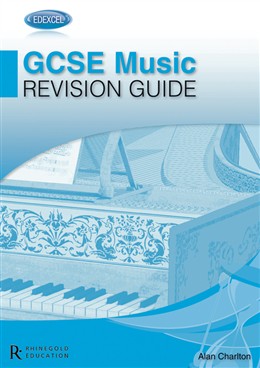
Edexcel GCSE Music Revision Guide
Rhinegold Education, ISBN 9781907447099
“Tailored to the new Edexcel GCSE Music specification (first examination in 2011), this revision guide presents all of the key information that Edexcel students need to know for success in their written exam, without unnecessary detail and complications. Contents include key facts about each of the 12 set works; revision tips; how to write about the elements of music; test yourself questions; a comprehensive glossary that enables you to check that you understand the key terms. This revision guide has been written by an experienced teacher and examiner in a concise and friendly manner. It will help you to achieve the best results possible.”
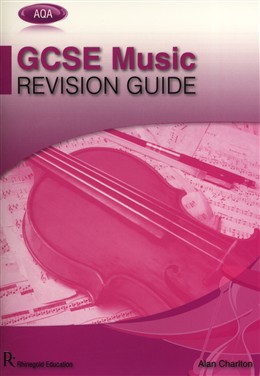
AQA GCSE Music Revision Guide
Rhinegold Education, ISBN 9781907447167
“This revision guide presents all of the key information that you will need to know for your written exam. Without going into unnecessary detail, it includes: a revision section on the elements of music; the most important facts about all of the topics in each of the three strands; revision tips; test yourself questions; listening suggestions; a comprehensive glossary. This revision guide has been written by an experienced teacher and examiner in a concise and friendly manner. It will help you to achieve the best results possible.”
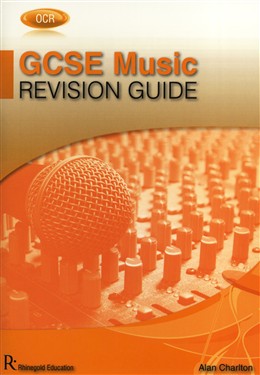
OCR GCSE Music Revision Guide
Rhinegold Education, ISBN 9781907447204
“This revision guide presents all of the key information that you will need to know for your written exam. Without going into unnecessary detail, it includes: a revision section on the elements of music; the most important facts about all of the topics in Areas of Study 2, 3 and 4; revision tips; test yourself questions; listening suggestions; a comprehensive glossary that you can use to check you understand the key terms. This revision guide has been written by an experienced teacher and examiner in a concise and friendly manner. It will help you to achieve the best results possible.”

Music Composition Workbook Volume 1
Rhinegold Publishing, ISBN 9781906178307
“This workbook will help students gain the necessary skills and confidence to write a successful composition at GCSE. A series of forms, styles and genres are covered, including music for special occasions, verse and chorus, ternary form, theme and variations, minimalism, rondo, musique concrete, film and programme music. There are various exercises throughout, building in difficulty to help students gain the required level of knowledge to work towards their first composition.”

AS Music Composition Workbook
Rhinegold Publishing, ISBN 9781906178314
“The AS Music Composition Workbook will help students gain the necessary skills and confidence to write a successful composition for AS music. It assumes a GCSE level understanding of composition, and offers a series of exercises focusing on developing musical ideas, textures, word-setting, harmonisation and orchestration. There is also detailed advice on how to write effectively for a variety of instruments and how to plan a composition.”
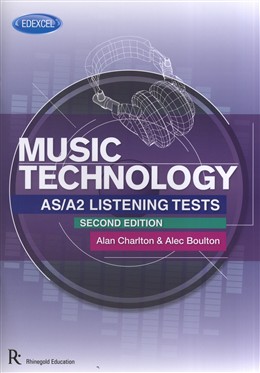
Edexcel AS/A2 Music Technology Listening Tests – 2nd Edition
Rhinegold Publishing, ISBN 9781906178901
This book contains a series of questions that will help you to prepare fully for Unit 2 (Listening and Analysing) of your AS Music Technology course, and Unit 4 (Analysing and Producing) of the A2. It has been carefully written by an experienced teacher and examiner to match the requirements of the new Edexcel GCE Music Technology specification (for first examination in 2009/2010). It can be used for coursework or for revision and preparation in the final weeks before your exam.
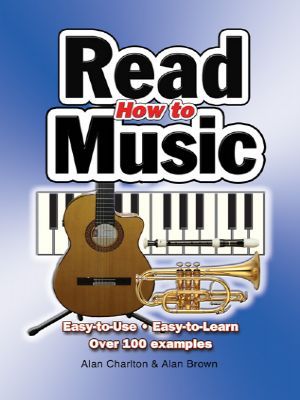
How to Read Music
Flame Tree Publishing, ISBN 9781847863058
“This is a comprehensive and easy-to-follow guide on learning how to read music from scratch. It introduces the elements of staff notation one by one, with foolproof explanations and copious examples, covering notes of the treble and bass clefs, rhythm, time signatures, accidentals, key signatures and chords. A particular strength of the book is its huge number of practice exercises, which include word games and well-known melodies. Examples are illustrated throughout with keyboard diagrams and guitar tab, making this the ideal book for keyboard players and guitarists who wish to learn music reading skills.”
4,000 words, 384 illustrations, 384 pages, paperback with plastic wiro, 171 x 132 mm
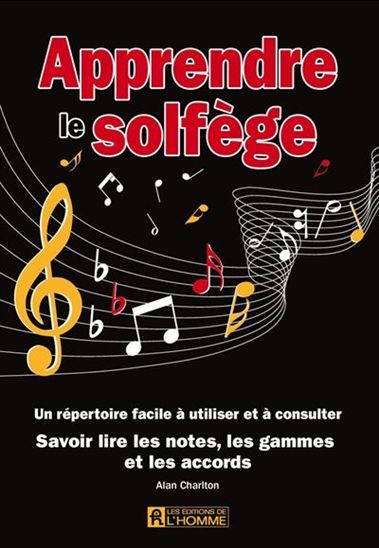
Apprendre le solfege
Renaud-Bray, ISBN 9782761929875
“Une approche simple et facile à comprendre. Une méthode agrémentée de quantité d’exemples et de diagrammes. Apprenez tout sur le solfège, les gammes et les accords.”
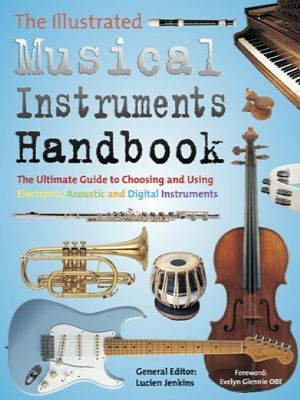
The Illustrated Musical Instruments Handbook
Flame Tree Publishing, ISBN 978184451520
Author of Chronological Overview and Ensembles sections
“This full-colour comprehensive reference guide provides the ideal way to discover more about the world of instruments, from their origins to how they are played and what they sound like. Organised alphabetically, it allows the reader to learn about instruments from all over the globe and from throughout history to today’s most modern electronic equipment.”
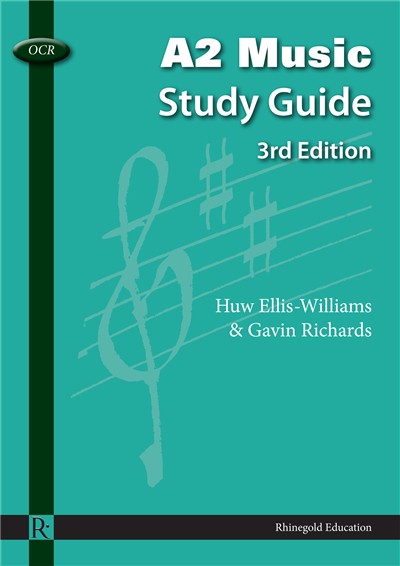
OCR A2 Music Study Guide, 3rd Edition
Rhinegold Education, ISBN 978190617858
author of section on Stockhausen Stimmung
“This is a study guide that you can use throughout your OCR A2 Music course as an effective supplement to your school work. The detailed information on each of the historical topics is written by experts in a clear and approachable style. The chapters cover the set works for historical topics on Song, Programme Music, Music for the Screen, Music and Belief, Music for the Stage and Popular Music as well as suggestions for further listening and related study.”
Articles
Alan Charlton is a regular contributor of online resources for Rhinegold’s Music Teacher magazine, which are widely used by teachers throughout the UK and abroad. His articles are mostly geared towards the GCSE, A level and IB specifications, and include analysis and context information on set works from all eras and stylistic traditions, and guidance on composition, compositional techniques and listening. He has also written for Classroom Music, Early Music Review, SPNM’s New Notes Magazine, the MMA Journal, Ensemble and the Rhinegold British Music Education Yearbook.
Articles (for Music Teacher or Classroom Music unless otherwise stated):
- Minimalism (KS4), October 2011
- Edexcel A2 Music Applied Works 2012 (Gabrieli, Auric, Addy), September 2011
- IB/AQA AS: Mozart Jupiter Symphony, May 2011
- Edexcel AS: Instrumental music (2011) revision (Tippett, Webern, Berio), March 2011
- Edexcel A2: Instrumental music (2011) (Shostakovich, Ellington, Davis), January 2011
- Edexcel A2: Applied Music (2011) (Bach, Bernstein, Jig and Reel), Autumn 1, 2010-11
- AQA and Edexcel GCSE: composing in a Classical style, Summer Term 2, 2009-10
- IB: Copland – El Salon Mexico, Summer Term 1, 2009-10
- Edexcel AS: composition, Spring Term 2, 2009-10
- Arranging (GCSE)
- Chamber Music from Mendelssohn to Debussy (AQA A2)
- The String Quartet from Haydn to Bartók (GCSE)
- Composition Presentation Skills (AS/A2)
- Expressionism (GCSE)
- The Waltz (AQA/OCR GCSE)
- Bach’s Brandenburg Concertos (AS/A2)
- Stravinsky’s Compositional Techniques
- The Use of Music Notation Software in Composition
- Composing String Quartets in the Classical Style (OCR A2)
- Compositional Techiques: AS Serialism (Edexcel)
- Haydn Trumpet Concerto, Third Movement (OCR AS level Set Work)
- Developing Aural Skills at AS level
- What is an Orchestra? (AQA GCSE music)
- Berlioz March to the Scaffold from Symphonie Fantastique (OCR AS level music)
- Music and Dance (OCR GCSE music)
- Funeral Music (GCSE music)
- Writing for Strings (A level music)
- Writing for Piano (AS level music) (Music Teacher)
- Composition from GCSE to A level (Rhinegold Guide to Music Education)
- The composition of Look and Bow Down (Early Music Review, 2003)
- Cover article on the first conference for Composers-in-Residence at schools (New Notes Magazine, 2002)
- Composing and Arranging for School Ensembles (Ensemble, the magazine of the MMA, 2001)
Reviews
Alan Charlton has reviewed a diverse range of musical education resources, including new music, books, music software, ICT resources and websites.
Reviews (for Music Teacher or Classroom Music unless otherwise stated):
- Software:
- Pro Tools SE
- Transcribe
- Notion 3
- Music Ace 1
- Band-in-a-Box
- Books and DVDs:
- The Composer’s Handbook 2
- Teach Yourself Pro Tools
- Alfred Teach Yourself DVDs: Pro Tools, Logic, Cubase, Garageband, Sonar
- Peters GCSE Composition Guides
- Music Express Year 7 Book 1
- Music Express Year 7 Book 2
- Rites of Passage (NAME)
- Websites:
- Sound Rights
- INTOIT
- Music:
- Music for French horn (for Music Teacher)